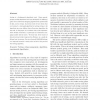Free Online Productivity Tools
i2Speak
i2Symbol
i2OCR
iTex2Img
iWeb2Print
iWeb2Shot
i2Type
iPdf2Split
iPdf2Merge
i2Bopomofo
i2Arabic
i2Style
i2Image
i2PDF
iLatex2Rtf
Sci2ools
126
click to vote
ACSC
2003
IEEE
2003
IEEE
Efficient Trie-Based Sorting of Large Sets of Strings
Sorting is a fundamental algorithmic task. Many generalpurpose sorting algorithms have been developed, but efficiency gains can be achieved by designing algorithms for specific kinds of data, such as strings. In previous work we have shown that our burstsort, a trie-based algorithm for sorting strings, is for large data sets more efficient than all previous algorithms for this task. In this paper we re-evaluate some of the implementation details of burstsort, in particular the method for managing buckets held at leaves. We show that better choice of data structures further improves the efficiency, at a small additional cost in memory. For sets of around 30,000,000 strings, our improved burstsort is nearly twice as fast as the previous best sorting algorithm.
ACSC 2003 | Generalpurpose Sorting Algorithms | Sorting | Sorting Algorithm | Theoretical Computer Science |
Related Content
| Added | 23 Aug 2010 |
| Updated | 23 Aug 2010 |
| Type | Conference |
| Year | 2003 |
| Where | ACSC |
| Authors | Ranjan Sinha, Justin Zobel |
Comments (0)

